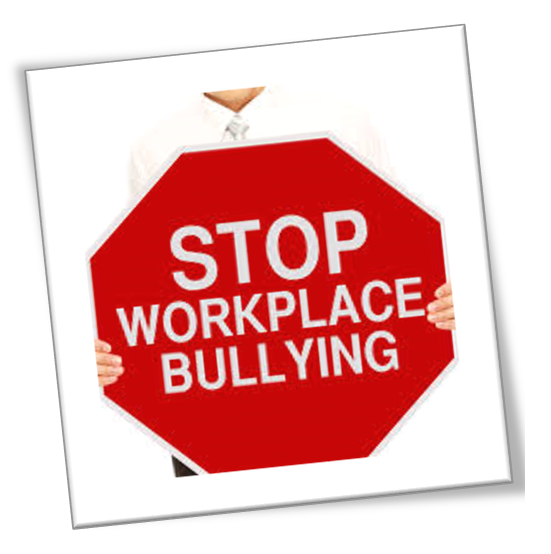Bullying has been making headlines in recent times, including television programs dedicated to talking about bullying. This is what the Fair Work Commission website says about bullying –
Bullying at work, as defined by the Fair Work Act 2009, occurs when: a person or a group of people behaves unreasonably and repeatedly towards a worker or a group of workers while at work, and the behaviour creates a risk to health and safety.

Examples of unreasonable behaviour are:
- behaving aggressively
- teasing or practical jokes
- pressuring someone to behave inappropriately
- excluding someone from work related events, or
- unreasonable demands
Bullying can happen in ANY workplace
Let’s talk about some of these examples starting with behaving aggressively – what is aggressive behaviour in the workplace? Besides the obvious of physical aggression, including slapping or punching someone, aggressive behaviour can also be verbal abuse and spreading rumours about your colleagues.
According to the Department of Mines, Industry Regulation and Safety’s there are, in Western Australia, on average, more than 450 cases of employees who have claimed worker’s compensation from issues arising from aggression in the workplace, keep in mind that these are the cases that are reported. It’s highly likely that there are many more cases that go unreported.

Teasing or Practical Jokes
In my opinion this is a tough one, as Australians we love a practical joke and most of us tease each other, take the mickey in a non-threatening way, so where do we draw the line?
If you feel the ‘’joke’’ is discriminatory (racist, sexist, ageist, phobic), then it may be considered as bullying. You could look at the intention behind the joke, is it meant to humiliate you in front of your colleagues? Is it degrading? Cruel? Hostile? If you’re saying yes to any of these, guess what? You’re being bullied.
On the other hand, your workplace may have an all-inclusive good natured teasing/ribbing culture? It’s a murky borderline.
Unreasonable demands
An overly demanding boss may be someone who sets extremely high standards and expectations on work deliverables or goals, which may be unrealistic or unsustainable. If you find your project/task list growing and changing rapidly and targets increasing, you just may have an overly demanding boss, or you may have a boss who is setting unreasonable demands.
A boss who gives unreasonable demands doesn’t empathize or understand what’s required for you to deliver results, and he/she will keep pushing you until you act.

It’s important to understand, however, that even though sometimes things might seem unfair, they don’t necessarily involve bullying. For example, your boss can sack you, transfer you, not promote you, discipline you, or direct and control the work that you carry out, if the decision is reasonable and the manager/boss acts in a reasonable way, it is not bullying.
What do I do if I’m bullied in the workplace?
If you’re being bullied at work, there are things you can do to stop it. They include:
- checking your workplace’s policy on bullying and harassment
- keeping written records – keep a diary and record incidents that involve bullying towards you
- talking to people you trust, like friends or family
- talking to the bully about their behaviour, if you feel safe doing this
- reporting it to a manager, supervisor, HR officer, or union rep
- contacting the Fair Work Commission
- going to the police.
What are my rights?
All companies and organisations in Australia must make sure their workers are not exposed to health and safety risks in the workplace. This includes having systems in place to prevent and respond to workplace bullying.

There are also laws about discrimination in the workplace, and laws against sexual harassment. Violent behaviour, threatening behaviour, and stalking are also illegal.
Any worker who believes they are being bullied can apply to the Fair Work Commission for an order to stop the bullying.
If you inform your workplace that you are experiencing bullying, your workplace should:
- respond to you as quickly as possible
- treat the report seriously
- inform you of how they will deal with it
- make sure everything is kept confidential
- allow everyone to explain their version of events
- not take sides
- tell you about any support you can get – your workplace may have an Employee Assistance Program in place.
- allow you to take someone else to meetings, like a friend or union rep. For some people this makes them feel more comfortable
- keep records of conversations, meetings and interviews
- attempt to resolve things and let you know the outcome.
For more information read
- DMIRS – Guideline Dealing with bullying at work
- Commission for OSH – Guidance Note Dealing with bullying at works
- Commission for OSH – Code of Practice Violence, aggression and bullying at work
- Public Sector Commission – Prevention of workplace bullying
Hopefully this blog has given you an insight into Workplace bullying. If you need additional support within your workplace on this or any other safety matter, do not hesitate to call Integrate Sustainability on 08 9466 0338 or email us at enquiries@integratesustainability.com.au.
For fans of ABC TV series “Utopia” here is a link to S3E5 which offers a slight comedic take on bullying in the workplace: http://iview.abc.net.au/programs/utopia/CO1511V005S00#playing
